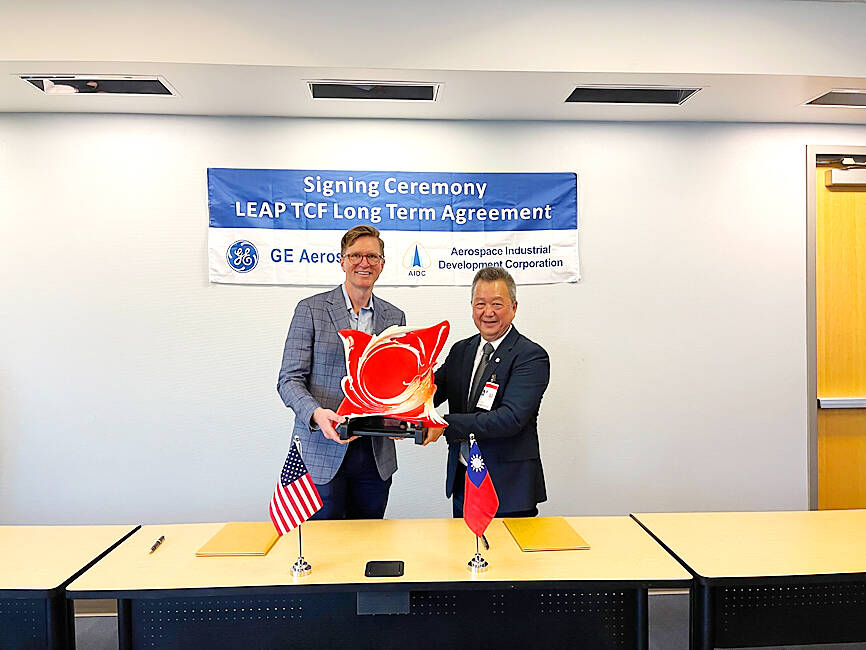Aerospace Industrial Development Corp (AIDC, 漢翔航空) shares yesterday soared 10 percent, the maximum daily increase allowed on the Taiwan Stock Exchange, after the company on Tuesday announced that it had secured orders of more than NT$35 billion (US$1.15 billion) to provide engine components to GE Aerospace Inc.
The 10-year contract with US-based GE Aerospace was the Taiwanese company’s first long-term order after the recovery of air transportation in the wake of the COVID-19 pandemic, AIDC said in a statement.
AIDC, a maker of military and civil aviation products, would manufacture central structural components for GE Aerospace’s LEAP turbine engines, the company said.

Photo courtesy of Aerospace Industrial Development Corp via CNA
LEAP engines power Airbus SE’s A320neo and Boeing Co’s 737 MAX aircrafts.
AIDC in 2018 signed contracts with GE Aerospace to manufacture 17 LEAP engine components.
The new contract is to take effect in 2026 and run until 2035, the company said, adding that it expects the deal to help generate steady, significant revenue.
Prices under the contract are adjustable to take into account inflation and the results of follow-up negotiations, it said.
AIDC said the aerospace industry’s outlook is rosy, adding that the GE deal would ensure that its factories operate at full capacity.
Despite the COVID-19 slump, it maintained its facilities and trained employees throughout the pandemic, it added.
AIDC’s cumulative revenue rose 72 percent annually to NT$9.94 billion for the first three months of this year, company data showed.
Global passenger numbers last year recovered to about 68.5 percent of pre-pandemic levels, the company said, citing International Air Transport Association data.
Boeing has forecast that airlines would need 41,170 new aircraft from last year to 2041, while Airbus forecast that 39,490 new planes would be needed, it said.
AIDC said it previously manufactured front compressor cases for LEAP engines, as well as middle compressor cases, combustion chamber diffuser cases, engine hot sections and engine central structural components.
Led by AIDC chairman Hu Kai-hung (胡開宏), the company signed the deal at GE Aerospace’s headquarters in Cincinnati, Ohio, on Tuesday.

SEEKING CLARITY: Washington should not adopt measures that create uncertainties for ‘existing semiconductor investments,’ TSMC said referring to its US$165 billion in the US Taiwan Semiconductor Manufacturing Co (TSMC, 台積電) told the US that any future tariffs on Taiwanese semiconductors could reduce demand for chips and derail its pledge to increase its investment in Arizona. “New import restrictions could jeopardize current US leadership in the competitive technology industry and create uncertainties for many committed semiconductor capital projects in the US, including TSMC Arizona’s significant investment plan in Phoenix,” the chipmaker wrote in a letter to the US Department of Commerce. TSMC issued the warning in response to a solicitation for comments by the department on a possible tariff on semiconductor imports by US President Donald Trump’s

The government has launched a three-pronged strategy to attract local and international talent, aiming to position Taiwan as a new global hub following Nvidia Corp’s announcement that it has chosen Taipei as the site of its Taiwan headquarters. Nvidia cofounder and CEO Jensen Huang (黃仁勳) on Monday last week announced during his keynote speech at the Computex trade show in Taipei that the Nvidia Constellation, the company’s planned Taiwan headquarters, would be located in the Beitou-Shilin Technology Park (北投士林科技園區) in Taipei. Huang’s decision to establish a base in Taiwan is “primarily due to Taiwan’s talent pool and its strength in the semiconductor

An earnings report from semiconductor giant and artificial intelligence (AI) bellwether Nvidia Corp takes center stage for Wall Street this week, as stocks hit a speed bump of worries over US federal deficits driving up Treasury yields. US equities pulled back last week after a torrid rally, as investors turned their attention to tax and spending legislation poised to swell the US government’s US$36 trillion in debt. Long-dated US Treasury yields rose amid the fiscal worries, with the 30-year yield topping 5 percent and hitting its highest level since late 2023. Stocks were dealt another blow on Friday when US President Donald

UNCERTAINTY: Investors remain worried that trade negotiations with Washington could go poorly, given Trump’s inconsistency on tariffs in his second term, experts said The consumer confidence index this month fell for a ninth consecutive month to its lowest level in 13 months, as global trade uncertainties and tariff risks cloud Taiwan’s economic outlook, a survey released yesterday by National Central University found. The biggest decline came from the timing for stock investments, which plunged 11.82 points to 26.82, underscoring bleak investor confidence, it said. “Although the TAIEX reclaimed the 21,000-point mark after the US and China agreed to bury the hatchet for 90 days, investors remain worried that the situation would turn sour later,” said Dachrahn Wu (吳大任), director of the university’s Research Center for